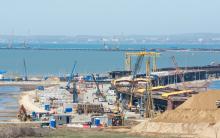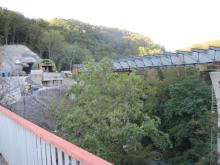The first stage of a controversial Russian bridge project is now complete, with the link opening to use by cars. The Kerch Strait bridge spans the Black Sea, connecting Russia’s Taman Peninsula in Krasnodar with Crimea, the latter having been controversially annexed by Russia from Ukraine in 2014. The official opening of the 19km-long bridge was carried out by Russia’s president, Vladimir Putin, who drove across the link in a Kamaz truck to reach the city of Kerch. The US$2.7 billion bridge forms part of
The first stage of a controversial Russian bridge project is now complete, with the link opening to use by cars. The Kerch Strait bridge spans the Black Sea, connecting Russia’s Taman Peninsula in Krasnodar with Crimea, the latter having been controversially annexed by Russia from Ukraine in 2014.
The official opening of the 19km-long bridge was carried out by Russia’s president, Vladimir Putin, who drove across the link in a Kamaz truck to reach the city of Kerch. The US$2.7 billion bridge forms part of a plan to improve transport to the city of Kerch as well as the rest of the Crimea Peninsula. The four lane cable-stayed bridge will carry heavy trucks when it is fully commissioned, while another twin track crossing being built alongside will provide a rail link. For the moment, only cars or other light vehicles will use the bridge, which now has the accolade of being the longest bridge in the Russian Federation. The various road links on either side of the bridge have also yet to be fully completed. When the bridge is finished, it is expected to handle around 40,000 vehicles/day and this will help redevelop Crimea as a holiday destination for Russians and boost the local economy.
The structure has been built by the SGM Group, owned by Arkady Rotenburg, and has been opened ahead of its schedule. This is a major technical achievement for the Russian designers and builders as it comes in spite a number of major engineering challenges posed by the tough winter climate and difficult geological conditions. However there are some concerns as to how the bridge will cope over the long term, given the unstable geology and heavy winter ice. The bridge builders say that the structure will be secure though, as many of the piles on which it is built have been driver to depths of over 90m. There has also been criticism of the structure from Ukraine, which says that its 35m height above water does not allow sufficient clearance for larger vessels to pass underneath.
The bridge is understandably a sore point for Ukraine due to the political tensions with Russia. The two countries had previously agreed to build a bridge over the Kerch Strait but this agreement was annulled when Russia and Ukraine entered hostilities over the disputed Crimea territory. Russia then opted to push ahead with the project on its own. The link was necessary to improve the connection to the city of Kerch and the surrounding area, which was forced to rely on ferry services with Russia after being annexed.
This is not the first bridge across the Kerch Strait as a structure was erected during WWII, although this only lasted for a short period before falling victim to the tough winter ice conditions.
The official opening of the 19km-long bridge was carried out by Russia’s president, Vladimir Putin, who drove across the link in a Kamaz truck to reach the city of Kerch. The US$2.7 billion bridge forms part of a plan to improve transport to the city of Kerch as well as the rest of the Crimea Peninsula. The four lane cable-stayed bridge will carry heavy trucks when it is fully commissioned, while another twin track crossing being built alongside will provide a rail link. For the moment, only cars or other light vehicles will use the bridge, which now has the accolade of being the longest bridge in the Russian Federation. The various road links on either side of the bridge have also yet to be fully completed. When the bridge is finished, it is expected to handle around 40,000 vehicles/day and this will help redevelop Crimea as a holiday destination for Russians and boost the local economy.
The structure has been built by the SGM Group, owned by Arkady Rotenburg, and has been opened ahead of its schedule. This is a major technical achievement for the Russian designers and builders as it comes in spite a number of major engineering challenges posed by the tough winter climate and difficult geological conditions. However there are some concerns as to how the bridge will cope over the long term, given the unstable geology and heavy winter ice. The bridge builders say that the structure will be secure though, as many of the piles on which it is built have been driver to depths of over 90m. There has also been criticism of the structure from Ukraine, which says that its 35m height above water does not allow sufficient clearance for larger vessels to pass underneath.
The bridge is understandably a sore point for Ukraine due to the political tensions with Russia. The two countries had previously agreed to build a bridge over the Kerch Strait but this agreement was annulled when Russia and Ukraine entered hostilities over the disputed Crimea territory. Russia then opted to push ahead with the project on its own. The link was necessary to improve the connection to the city of Kerch and the surrounding area, which was forced to rely on ferry services with Russia after being annexed.
This is not the first bridge across the Kerch Strait as a structure was erected during WWII, although this only lasted for a short period before falling victim to the tough winter ice conditions.






